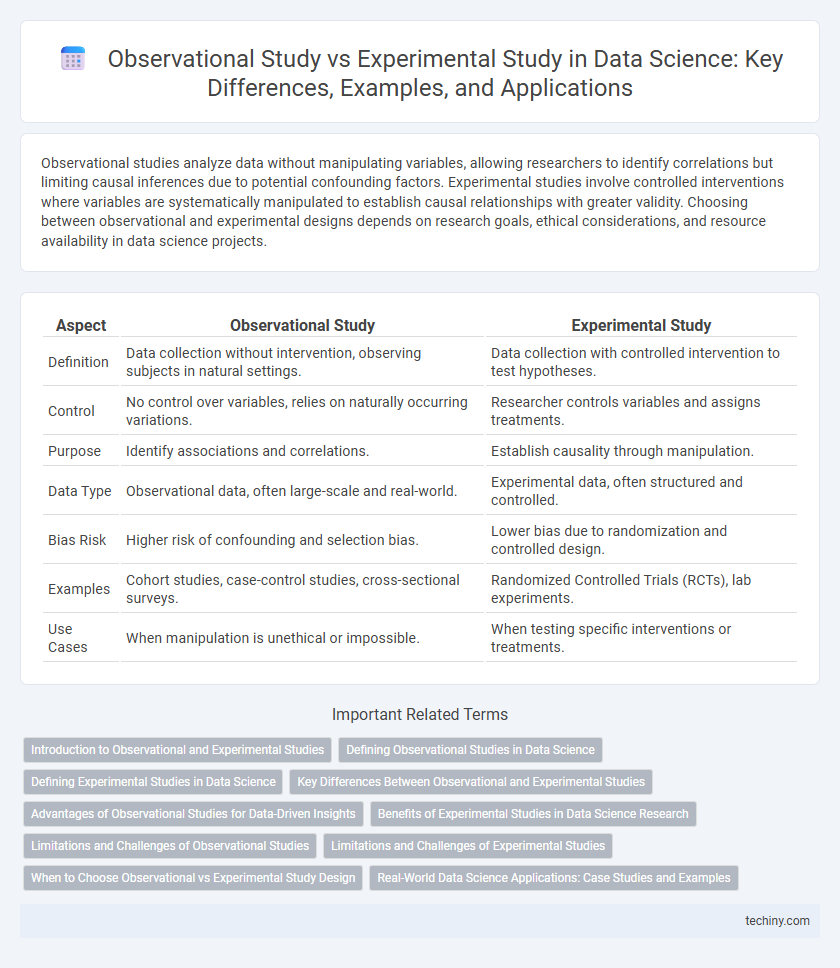Observational studies analyze data without manipulating variables, allowing researchers to identify correlations but limiting causal inferences due to potential confounding factors. Experimental studies involve controlled interventions where variables are systematically manipulated to establish causal relationships with greater validity. Choosing between observational and experimental designs depends on research goals, ethical considerations, and resource availability in data science projects.
Table of Comparison
| Aspect | Observational Study | Experimental Study |
|---|---|---|
| Definition | Data collection without intervention, observing subjects in natural settings. | Data collection with controlled intervention to test hypotheses. |
| Control | No control over variables, relies on naturally occurring variations. | Researcher controls variables and assigns treatments. |
| Purpose | Identify associations and correlations. | Establish causality through manipulation. |
| Data Type | Observational data, often large-scale and real-world. | Experimental data, often structured and controlled. |
| Bias Risk | Higher risk of confounding and selection bias. | Lower bias due to randomization and controlled design. |
| Examples | Cohort studies, case-control studies, cross-sectional surveys. | Randomized Controlled Trials (RCTs), lab experiments. |
| Use Cases | When manipulation is unethical or impossible. | When testing specific interventions or treatments. |
Introduction to Observational and Experimental Studies
Observational studies analyze existing data without intervention, allowing researchers to identify patterns and correlations in natural settings. Experimental studies involve controlled manipulation of variables to establish causal relationships by assigning subjects to treatment or control groups. Both methods are essential in data science for deriving insights and validating hypotheses from diverse datasets.
Defining Observational Studies in Data Science
Observational studies in data science involve analyzing data without manipulating variables, allowing researchers to identify patterns and correlations in natural settings. These studies rely on existing data sources or real-world data collection, making them essential for understanding phenomena where controlled experiments are impractical or unethical. Observational studies provide valuable insights but require careful consideration of confounding variables to ensure valid inferences.
Defining Experimental Studies in Data Science
Experimental studies in data science involve the deliberate manipulation of variables to observe causal effects on outcomes. These studies utilize controlled environments and random assignment to treatments, enabling scientists to establish stronger causal inferences compared to observational studies. Techniques such as A/B testing and randomized controlled trials are commonly employed to validate hypotheses and optimize predictive models.
Key Differences Between Observational and Experimental Studies
Observational studies analyze data without intervention, identifying correlations by monitoring natural behaviors, while experimental studies involve controlled manipulation of variables to establish causal relationships. Sampling methods in observational studies often rely on existing populations, whereas experimental studies use randomized assignments to minimize bias. Data quality in experimental studies tends to be higher due to controlled conditions, enabling more robust causal inferences compared to observational counterparts.
Advantages of Observational Studies for Data-Driven Insights
Observational studies offer the advantage of analyzing real-world data without manipulating variables, enabling data scientists to capture natural behaviors and trends across diverse populations. They provide cost-effective and timely insights, especially in scenarios where controlled experiments are impractical or unethical. Leveraging large datasets from observational studies enhances the ability to identify correlations and generate hypotheses for further experimental validation.
Benefits of Experimental Studies in Data Science Research
Experimental studies in data science offer the advantage of controlled environments, allowing researchers to manipulate variables and establish causal relationships with higher precision. This control reduces confounding factors and enhances the reliability of findings, making insights more actionable for predictive modeling and algorithm development. The ability to conduct randomized trials improves the validity of conclusions drawn from complex data ecosystems, facilitating more robust and reproducible results.
Limitations and Challenges of Observational Studies
Observational studies in data science face challenges such as confounding variables and selection bias that limit causal inference. The inability to randomly assign subjects increases the risk of hidden biases influencing results, reducing the study's internal validity. Data scientists must implement advanced statistical techniques like propensity score matching to mitigate these limitations and approximate experimental conditions.
Limitations and Challenges of Experimental Studies
Experimental studies in data science face significant limitations including high costs, ethical concerns, and logistical complexities when manipulating variables to observe outcomes. Challenges arise from potential biases such as selection bias and confounding variables, which can threaten the internal validity and generalizability of results. Additionally, controlled experimental settings may lack ecological validity, limiting the applicability of findings in real-world scenarios.
When to Choose Observational vs Experimental Study Design
Observational studies are preferred when manipulation of variables is impractical, unethical, or impossible, such as in epidemiological research or social behavior analysis. Experimental studies are most effective when researchers can control variables and randomly assign subjects to establish causal relationships, commonly used in clinical trials and controlled laboratory settings. Selecting between these designs depends on the research objectives, ethical considerations, and feasibility of intervention or control over study variables.
Real-World Data Science Applications: Case Studies and Examples
Observational studies in data science analyze existing datasets to identify correlations without intervention, such as customer behavior analysis or social media trends. Experimental studies involve controlled interventions like A/B testing to determine causal effects, commonly applied in optimizing product features or marketing campaigns. Real-world case studies demonstrate observational data driving predictive models, while experimental designs validate these models' effectiveness in dynamic environments.
observational study vs experimental study Infographic

 techiny.com
techiny.com